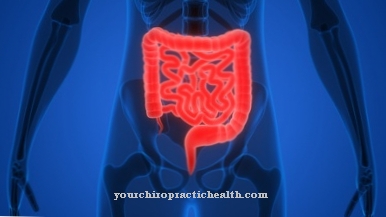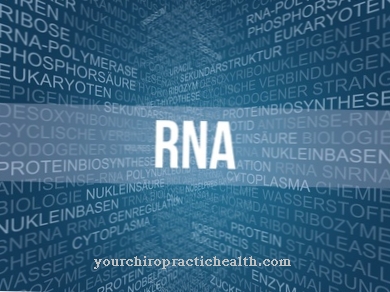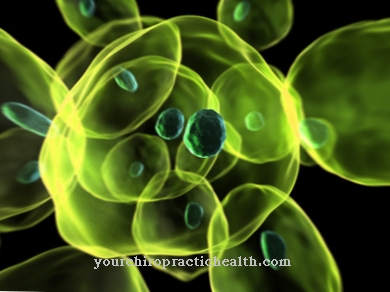The absorption In medicine, it describes the absorption of a substance by the metabolism. An externally supplied active ingredient is rarely completely absorbed. The absorption happens to different degrees depending on the dosage form.
What is the absorption?

Active substances supplied to the body from outside are rarely completely absorbed by the body. Instead, some of the material is lost in the process of being absorbed. That portion that can be taken up and used by the metabolism is called resorbed or absorbed. According to this, absorption is the metabolic process in which the body absorbs active substances or components of food supplied from the outside.
The absorption mostly takes place at the cellular level, since individual molecules of the chemical substance supplied can be used in the context of cell metabolism.
The degree of possible absorption of a substance depends on its purity, its form of administration and, depending on the substance, also on the accompanying substances that are administered with it. For example, the absorption of some vitamins is higher when high-fat foods are eaten.
In medicine, absorption is relevant in the dosage and administration of medication as well as in food supplements with trace elements such as vitamins or minerals.
Function & task
Absorption is a natural process in the human body, which primarily serves to absorb finely dissolved substances from food. At the cellular level, vitamins, minerals and other trace elements can be absorbed by the body to a certain extent. The sooner these substances correspond to the condition that is favorable for absorption, the more of them are absorbed.
Just as absorption works with food, it also works with medication. These are also present in a composition that can be metabolized by the individual cell. The extent to which this happens depends on the manufacture of drugs and the choice of the correct dosage form.
The first task of absorption without a pharmacological background is to provide humans with micronutrients. Without the process of absorption, the body would not be able to absorb them, but it needs them to build up and maintain body substance.
In medicine, absorption is useful for the doctor when dosing and administering medication. It is the case with many drugs that they are absorbed to a much greater extent when injected directly than when they are administered orally.
In addition to these functions, absorption can also have a protective function. If, for example, a person ingests a spoiled food, the cells usually absorb toxins far before the nutritious components. The absorbed toxins, in turn, signal to the body that something is wrong with the food, so that it can react quickly with vomiting or diarrhea. If absorption happened later in digestion, there would be so many toxins in the body that it would be difficult to get rid of them. The rapid absorption of dangerous warning substances, on the other hand, means that the body defends itself against the poisoning at an early stage and can often fight it without medical support.
In the case of less toxic, but nonetheless harmful substances such as alcohol, which are usually also quickly absorbed, rapid absorption causes the body to react: people get drunk and can see for themselves where their limits are.
Illnesses & ailments
The absorption is a process that is itself very rarely affected by diseases. Some congenital metabolic diseases prevent the absorption of certain food components from birth or absorb them incorrectly. This, in turn, leads to sometimes serious illnesses, as the incorrect absorption means that not all of the necessary physical processes function correctly.
In the case of other hereditary diseases, on the other hand, absorption can work very well, but the absorbed substance is not processed correctly afterwards. It is therefore important to choose foods that either do not contain the problematic ingredient at all or in forms that are difficult to absorb. The less that can be absorbed, the fewer symptoms of illness then arise.
In some cases, drugs used to treat such diseases attack during absorption and try to prevent them. One example of this is lactose intolerance: Medicines neutralize the lactose in food so that it is not absorbed in the first place.
The normal absorption of food and medication may be disrupted in very slim or overweight people. Being overweight or underweight mainly influences the hormonal functions of the body, but these can also affect absorption. If you are underweight, for example, alcohol is absorbed very quickly.
In addition, absorption can be difficult depending on the diet. If the food contains many industrially processed ingredients, it can be difficult for the body to absorb the few remaining vitamins and minerals. He slips into malnutrition, which can lead to deficiency symptoms, even if the amount of food is sufficient based on the calories alone.
Absorption disorders caused by the administration of highly effective drugs, above all chemotherapy, are relatively common.The natural functions of the body are influenced so much that it can no longer properly absorb important nutritional components, so that they have to be administered in an easily absorbable form.
























.jpg)



